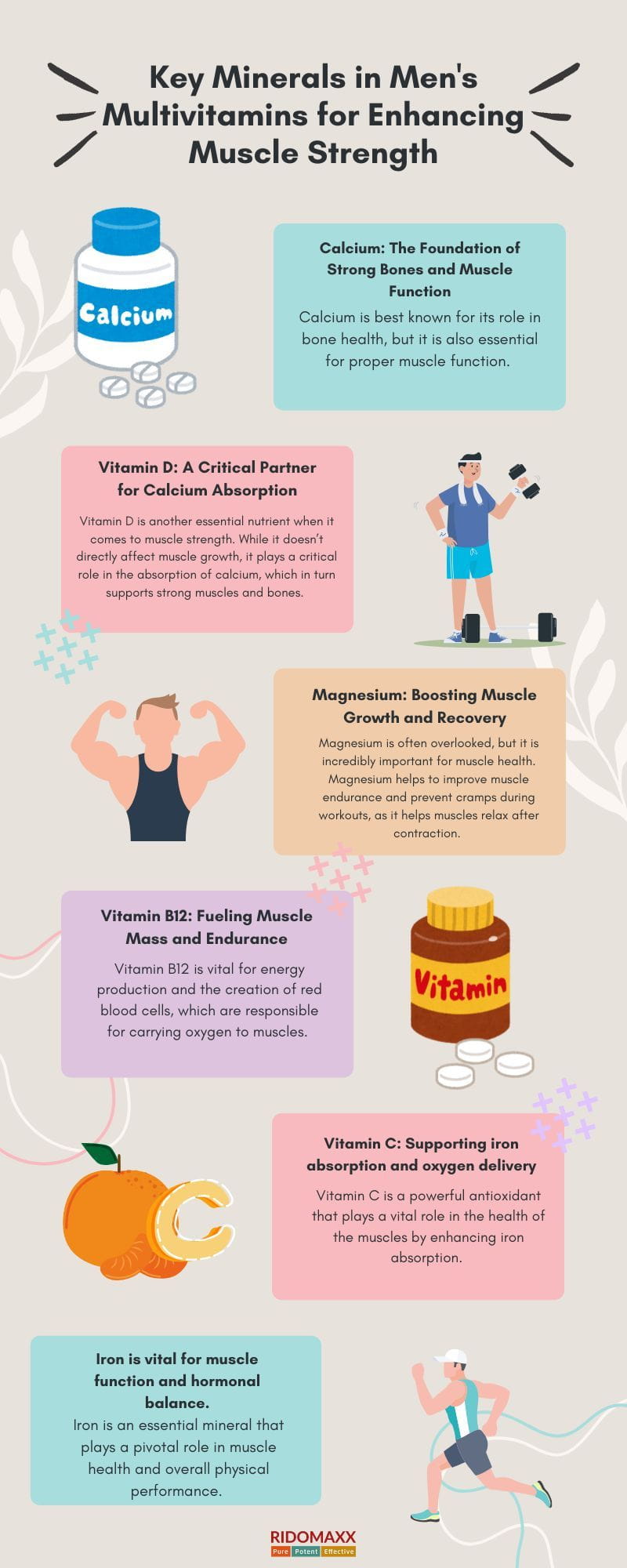Maintaining muscle strength and overall physical performance goes beyond just exercise; proper nutrition plays an equally important role. One of the most effective ways to ensure your body receives essential nutrients for muscle growth and recovery is by incorporating a well-rounded multivitamin into your daily routine. Men’s multivitamins are specifically formulated to include key vitamins and minerals that support not only overall health but also enhance muscle strength.
Certain minerals are crucial for muscle development, endurance, and recovery. Key minerals like calcium, magnesium, vitamin D, vitamin B12, vitamin C, and iron help fuel muscles, improve performance, and reduce fatigue. By understanding the importance of these nutrients and how they contribute to muscle health, men can make informed choices about their supplementation to enhance strength and maintain optimal muscle function. Whether you’re an athlete or simply looking to maintain an active lifestyle, the right minerals in your Multivitamin Men Tablets are essential for achieving your fitness goals.

Here are some key minerals in men’s multivitamins for enhancing muscle strength.
Calcium: The Foundation of Strong Bones and Muscle Function
Calcium is best known for its role in bone health, but it is also essential for proper muscle function. When muscles contract, calcium helps to regulate this process by interacting with proteins inside muscle fibers. Without enough calcium, muscles may become weak or prone to cramps. Furthermore, calcium works in tandem with other minerals to maintain a strong skeletal structure, ensuring that your bones can handle the stress of physical activities such as weightlifting or endurance sports. Adequate calcium intake through multivitamins is key to supporting both muscle strength and skeletal health.
Vitamin D: A Critical Partner for Calcium Absorption
Vitamin D is another essential nutrient when it comes to muscle strength. While it doesn’t directly affect muscle growth, it plays a critical role in the absorption of calcium, which in turn supports strong muscles and bones. Vitamin D also aids in muscle function by reducing inflammation and supporting the nervous system’s communication with muscles. For individuals who exercise regularly or lift weights, vitamin D helps ensure that your muscles get the calcium they need to function at their best. It also helps to prevent muscle weakness and reduce the risk of injury.
Magnesium: Boosting Muscle Growth and Recovery
Magnesium is often overlooked, but it is incredibly important for muscle health. This mineral plays a role in more than 300 biochemical reactions in the body, including muscle function and protein synthesis, which is the process by which the body builds muscle. Magnesium helps to improve muscle endurance and prevent cramps during workouts, as it helps muscles relax after contraction. It also supports the metabolism of carbohydrates and fats, ensuring that your body has the energy required for muscle-building exercises. Supplementing magnesium can aid in muscle recovery and help with overall muscle growth and performance.
Vitamin B12: Fueling Muscle Mass and Endurance
Vitamin B12 is vital for energy production and the creation of red blood cells, which are responsible for carrying oxygen to muscles. The more oxygen your muscles receive, the better they perform during intense workouts, improving endurance and stamina. For athletes or those undergoing strength training, B12 plays a role in reducing muscle fatigue, enabling them to work out longer and with more intensity. Additionally, B12 supports muscle mass by promoting the production of proteins and contributing to overall health. A deficiency in B12 may lead to fatigue and decreased muscle strength, making it essential for anyone looking to optimize their performance.
Vitamin C: Supporting iron absorption and oxygen delivery
Vitamin C is a powerful antioxidant that plays a vital role in the health of the muscles by enhancing iron absorption. Iron is necessary for the production of hemoglobin, the protein in red blood cells that carries oxygen throughout the body. By ensuring optimal iron levels, vitamin C contributes to improved endurance and the ability to sustain physical effort over time. For anyone involved in endurance training or high-intensity workouts, vitamin C helps support efficient oxygen delivery to muscles, reducing fatigue and aiding muscle recovery after exercise.
Iron is vital for muscle function and hormonal balance.
Iron is an essential mineral that plays a pivotal role in muscle health and overall physical performance. It is required for the production of hemoglobin, which is responsible for transporting oxygen to tissues, including muscles. With adequate iron levels, muscles receive the oxygen they need for endurance and strength during exercise. Additionally, iron contributes to the production of collagen, which helps maintain healthy connective tissues, ligaments, and tendons. For athletes or individuals looking to build muscle strength, iron supplementation is vital to prevent iron-deficiency anemia, a condition that can lead to fatigue, reduced performance, and muscle weakness.

Conclusion
The key minerals found in men’s multivitamins play a significant role in enhancing muscle strength and supporting overall physical health. By ensuring adequate intake of calcium, vitamin D, magnesium, vitamin B12, vitamin C, and iron, men can optimize their muscle performance, reduce fatigue, and speed up recovery after workouts. These minerals work synergistically to promote healthy bones, improve endurance, and enhance muscle growth, making them essential for anyone looking to boost their fitness levels.
Choosing the best multivitamin tablets for men can help fill nutritional gaps and provide the body with the necessary nutrients it needs to perform at its best. The right multivitamin supplement can make a noticeable difference in muscle strength and overall health. When selecting a multivitamin, it’s important to focus on quality and ensure it includes a balanced blend of these key minerals for maximum benefit.


0 Comments